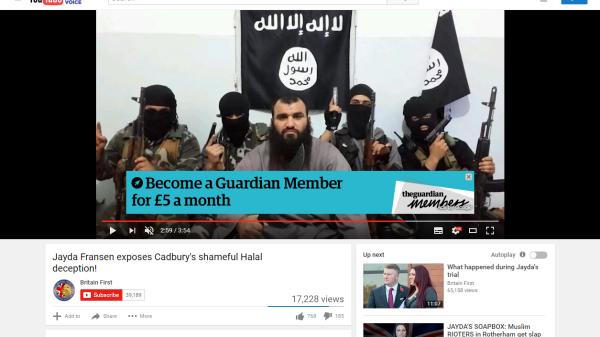This article is more than 1 year old
Google promises policy review after several big brands pull YouTube ads
Wow, who knew? Clients don't like to be associated with jihadis and racists
Google has promised a review of its ad policy on YouTube after a backlash from blue-chip advertisers. It follows a series of reports by The Times demonstrating big brand ads running over content that breaches YouTube guidelines, such as jihadist videos and other inflammatory or racist material.
French advertising giant Havas "paused" its UK ad spend with YouTube on Friday, reportedly £35m a year, and the Royal Bank of Scotland, Lloyds and HSBC followed suit at the weekend. The Cabinet Office halted its YouTube spending last week. The Metropolitan Police and The Guardian had also inadvertently been helping to fund the video producers.
Havas becomes the first of the global marketing groups to pull all its UK ad spend from Google/YT. Clients incl. O2, BBC, Royal Mail. £175m
— Mark Sweney (@marksweney) March 17, 2017
To be clear, @Havas_MGUK has 'paused' only YT & GDN activity & is working closely with Google to find a solution before un-pausing ad spend.
— Paul Frampton Calero (@Paul_Framp) March 17, 2017
Havas represents 240 clients in the UK, including the BBC, O2 and the Royal Mail. Not all ad agencies have hit pause. However, YouTube's prominence as the world's number-two ranking site (after Google's own search page) has left ad spenders with a dilemma. Because visitors spend considerable time on the site, chances are almost every visitor will see an advertisement.

Oops
Yet there's more to the agency boycott than meets the eye. The story isn't new. Evidence of Google "monetising" jihadi videos on YouTube – thereby providing a source of funding to dubious groups – appeared on BBC's Newsnight three years ago, and musicians have been complaining about big brand ads running alongside pirate material for even longer. Responding to their concerns, Google's Theo Bertram promised to "drain the swamp of dodgy networks, dodgy agencies and dodgy sites". Yet by 2015 Google was explaining to policy experts that the hate material offered a "messaging" opportunity.
"We don't believe that censoring the existence of ISIS on Google, YouTube or social media will dampen their impact really," said Google's chief counsel David Drummond. "We have to reach at-risk youth all over the world and divert them from hate and radicalisation," Drummond told an ad conference in Cannes in 2015.
For its part, the ad business has seen its expensive intermediary role usurped by the two vertically integrated networks of Google and Facebook, and responded by aping them. Th open market now offers media buyers programmatic tools similar to the in-house placement offered by the Silicon Valley duopoly.
But it isn't working.
By one estimate Google and Facebook hoovered up 99 per cent of growth in the digital ad industry last year. Take them away, and the ad business actually shrank. ®
